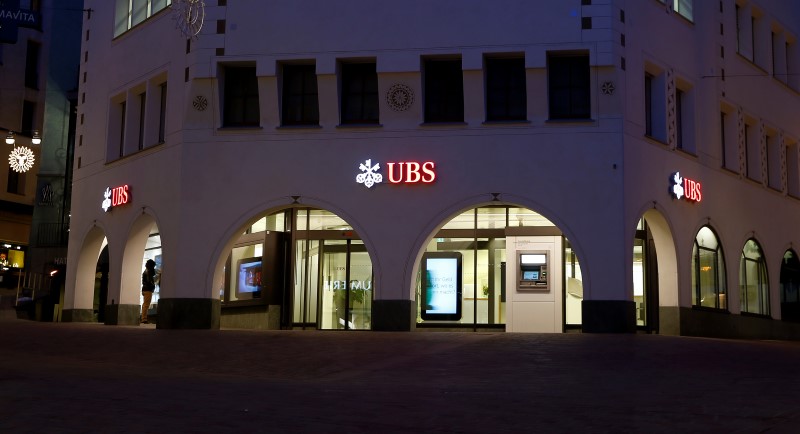By Joshua Franklin
ZURICH (Reuters) - UBS (S:UBSG) reported weaker earnings and capital on Tuesday, triggering the biggest drop in the Swiss bank's shares in more than a year, despite efforts to reassure investors with details of cost and job cuts.
Fresh cost-cutting measures and robust inflows at its private banking businesses failed to halt a stock slide that put the bank on course for its worst trading day since January 2015.
"It doesn't matter which division you want to look at, it was below consensus and, in combination with the lower capital ratio, that will lead to lower estimates for net profit and for the dividend," Zuercher Kanntonalbank analyst Andreas Brun, who rates UBS's stock as marketweight, said.
The world's largest wealth manager won investor praise for slimming down its investment bank and increasing its focus on the traditionally more stable business of looking after the assets of the world's wealthy after the financial crisis.
However, even this business was not immune to rocky markets at the start of 2016, which has led to many banks posting sharp revenue drops as their clients traded and invested less.
UBS said net profit for the first three months of 2016 fell 64 percent to 707 million Swiss francs (508.56 million pound) which while largely in line with the average estimate of 704 million francs in a Reuters poll of five analysts, was down from 1.98 billion francs in the same quarter last year.
Shares in the bank fell 8.3 percent by 1414 GMT, underperforming other European banks (SX7P).
The profit drop was exacerbated by the year-earlier comparison period being unusually strong when earnings were helped by a surge in foreign exchange dealing after the Swiss National Bank axed its currency cap.
UBS aims to return at least half its profits to shareholders if it maintains capital reserves equal to at least 13 percent of risk-weighted assets under global rules.
Its common equity tier 1 capital ratio was 14 percent at the end of March, down from 14.5 percent at the end of 2015.
The dividend is seen as one of the main attractions to holding UBS shares and the bank said it plans to pay an ordinary dividend of 0.60 francs per share and a special dividend of 0.25 francs per share for 2015.
"Looking at today's results and outlook, it might be less realistic to expect an increase in the dividend," Vontobel analyst Andreas Venditti, who rates the stock "buy", said.
Chief Executive Sergio Ermotti told analysts that the priority was to protect the "baseline" dividend and implement a progressive dividend policy, but that UBS needed to see how market conditions developed.
WEALTH MANAGEMENT CUTS
UBS also ramped up efforts to hit a 2.1 billion franc cost savings target by the end of 2017.
Wealth management head Juerg Zeltner told staff UBS would implement a new structure to cut costs in the division, which posted adjusted first-quarter pre-tax profit of 636 million francs, down from 856 million francs a year ago.
"What is good enough today is not going to be good enough tomorrow – we must do things better and faster," Zeltner said in a memo seen by Reuters.
The savings will partly come through a streamlining of the division's back office.
One bright spot in the results was the 29 billion francs in net new money from UBS's two private banking businesses, the highest such figure for a first quarter since 2008.
The measure is viewed as an important indicator for future revenue in wealth management. A net outflow of client assets at the end of 2015, largely due to withdrawals from Europe and some emerging markets, had raised some concerns.

New assets were boosted by Asia Pacific inflows as well as advisors hired from Credit Suisse (SIX:CSGN) bringing clients to UBS.